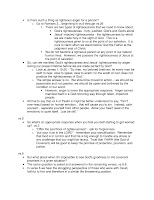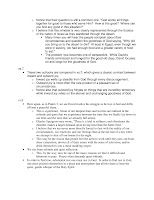- "Cush the Benjamite"
- We do not know who Cush was
- The name means "black"
- Some say "Cush" is a poetic name for King Saul. At the very leasty the name infers that this man was a kinsman, or at the very least a tribesman, of King Saul.
- Whether "Cush" is Saul or someone close to him is irrelevant. What matters is that David is speaking of a villain who is constantly speaking vile and false things against him.
- "Oh LORD [YHWH] my God [Elohim], in Thee do I put my trust:" - In my opinion this may be the most powerful way to begin prayers of praise or petition.
- "Oh LORD" - David calls on the Covenant God
- "my God" - David calls on Creator and Controller of all things.
- "in Thee do I put my trust" - if an individual means this than it will drastically change the words of the prayer that follows.
- What a great thing to have such a clear conscience. What a bold thing to come before God and be able to pray, "If I'm guilty of the things I'm being accused of then hand me over to my enemies. If not, then let my innocence be known."
- The only reason that David was able to pray like this was because David was indeed fully innocent before the Lord concerning not only this matter, but other matters as well.
- I think that it's important to understand that this is not a prayer that should be prayed if someone has simply got a few of the details of the story wrong about you. This prayer should only be prayed if the individual is completely innocent in terms of the accuser and the accusation.
- Slander is one of the most difficult things to fight. An individual's only hope is to be able to ask the Lord to vindicate you and justify you. It is impossible to do so for yourself.
- Notice that David asks God to act in judgment, to judge first the wicked and then to also judge the just.
- The fact that David asks God to judge the just is, perhaps, the key to honestly praying this prayer.
- Are we really willing to give God free reign over our church, our families, our religious friends, or ourselves.
- What does an honest examination of the righteous in the LORD bring to light? Sin. Sinners who are not yet perfected in the Lord. Which means that God might show us things that we need to get rid of, things that we need to cast off in order to put on Jesus.
- But understand how dangerous this prayer actually is... because people do not like to be told to change or move or that their not perfect.
- Think about it for a moment in terms of yourself. I am very quick to accept something that I may not have known before when some sort of new information comes my way. However, I am extremely hesitant to accept that I have been wrong about something that I felt I was informed about or justified in believing.
- However, if we are unwilling to ask for the all knowing God to judge us it would stand to reason that we are unwilling to do the hard work of personal and corporate spiritual growth.
- This alludes to something that we mentioned in our study on Psalm 6... the judgment and the punishment that is doled out by a loving parent is almost always a blessing.
- We should pray for God to judge His children (i.e. those who can claim His righteousness), but we must first be willing to invite the burning eye of God to turn on ourselves first. This is an extremely bold prayer.
- Do you want to grow spiritually? Do you feel like you aren't being challenged by your church or by your reading? Do you feel like you've hit a plateau in your maturation process? Pray this prayer. No excuses. No one else's to blame.
- "O, let the wickedness of the wicked come to an end." I love this part of David's prayer. What David is asking for here is for the evil that has been done and is being done by the wicked to bring about the wicked persons own end.
- Perhaps this might help us to understand how God can be both loving and at the same time holy when it comes to the eternal judgment of the unsaved.
- Understand that the request that David makes here is the exact way in which God's judgment of both the lost and the saved works.
- It is God's will that none should perish but God does not force His will upon humankind.
- In the end it will all be judged on our own righteousness and on our own misdeeds. All will be found guilty but those who have admitted their guiltiness and have asked for justification and redemption from God through the Son will be absolved of their guilt.
- Judgment and punishment are not the results of an incredibly unloving God... they are the result of our own wickedness. Salvation in spite of our wickedness, the very fact that God will allow any into His Kingdom is the result of an incredibly loving and merciful God.
- In his commentary on the Psalms author John Phillips expands on this idea saying, "Thus we see Haman being hanged on the gallows that he prepared for Mordecai. We see Jacob being cheated by his uncle in the same ways that he had cheated his father and his brother. We see David, later on in life, laying down with his own hands the paving stones along which the retribution of God followed. The principle of God's judgment is summed up in the sobering words: 'Whatsoever a man soweth that shall he also reap.' It is the law of the soil; it is also the law of the soul."
- This verse lends itself nicely to the above principle in that it tells us where our defense will lie when we face our ultimate judgment.
- It is God who saves and it is God who makes us upright in heart.
- These verses should serve as a comfort and as an urgent call to do the work of evangelism for the believer as we realize that God is not asleep at the wheel.
- Even now God is preparing for the final destruction and judgment of broken humankind.
- God will judge, God must judge, and because He is the only One who is worthy to judge, He must bring about the time of all humankinds judgment..
- In the concluding verses of this Psalm David describes and explains God's moral government of the universe.
- vs.14 - The process of an individual's sin is like the process of giving birth.
- Sin is first conceived of in the mind, it is then created through our actions, and it is finalized by what our actions bring forth.
- vs.15 - The premeditated nature of sin is like a trap which is set by the individual hoping to rob, ruin, or revile someone or something for their own benefit.
- This alludes to the fact that most sin isn't accidentally stumbled into.
- This type of sin happens but it must be understood and prevented in other ways.
- However, this type of sin happens rarely and most often cannot be prevented without a firm grasp on how to prevent premeditated sin.
- The picture that David paints here for us tells us that premeditated sin will inevitably be just like falling into a trap of our own creation.
- While sin might seem and feel like a good idea at the time, while it may appear to serve our best interest, it will always lead to our fall.
- David is explaining to us that God allows us to basically dig our own graves. We are the source of our own destruction.
- vs.16 - The inevitable punishment or our sin is like a boomerang. By our own power and our own actions we throw it out only to have it return to us.
- "LORD" - YHWH: David concludes this Psalm by calling out to the God of covenant who's righteousness demands judgment. But it doesn't end there because David continues by saying that He will praise the God of Covenant because of His power and control over sin and judgment.
- "LORD Most High" - YHWH Elyon: Covenant Controller.
- This closing designation for God informs the reader that our God is the one who blesses as well as judges and because He is just, and because He is merciful, and because He is good... we should lift our hearts, hands, and voices in praise and thanks to Him.

















.jpg)


